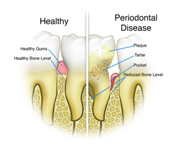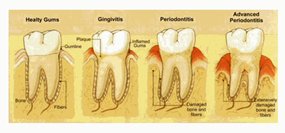 What are Gingivitis and Periodontitis?
Gum disease is manifested in two forms:
What are Gingivitis and Periodontitis?
Gum disease is manifested in two forms:Gingivitis: The earliest stage of gum disease, causing an inflammation and some bleeding of the gums caused by plaque build up at the gum line. Gingivitis causes gum inflammation but no bone loss.
Periodontitis: The second stage where the supporting bone and fibers that hold your teeth in place are damaged causing bone damage and loss.
How is GUM Disease Progressed And Treated?
Periodontal disease progresses as the sulcus (pocket space) between the tooth and gums gets filled with bacteria, plaque, and tartar, causing irritation to the surrounding tissues. When these irritants remain in the pocket space, they can cause damage to the gums and eventually, the bone that supports the teeth!
Gingivitis: If the disease is caught in the early stages of gingivitis, and no damage has been done, one to two regular cleaning will be recommended. You will also be given instructions on improving your daily oral hygiene habits and having regular dental cleaning.
 Periodontitis: If the disease has progressed to more advanced stages, a special periodonal cleaning called scaling and root planing (deep clearing) will be recommended. It is usually done one quadrant of the mouth at a time while the area is numb. In this procedure, tartar, plaque; and toxins are removed from above and below the gum line (scaling) and rough spots on pockets to shrink. Medications, special medicated mouth rinses, and an electric tooth brush may be recommended to help control infection and healing.
Periodontitis: If the disease has progressed to more advanced stages, a special periodonal cleaning called scaling and root planing (deep clearing) will be recommended. It is usually done one quadrant of the mouth at a time while the area is numb. In this procedure, tartar, plaque; and toxins are removed from above and below the gum line (scaling) and rough spots on pockets to shrink. Medications, special medicated mouth rinses, and an electric tooth brush may be recommended to help control infection and healing.
Gingivitis: If the disease is caught in the early stages of gingivitis, and no damage has been done, one to two regular cleaning will be recommended. You will also be given instructions on improving your daily oral hygiene habits and having regular dental cleaning.
 Periodontitis: If the disease has progressed to more advanced stages, a special periodonal cleaning called scaling and root planing (deep clearing) will be recommended. It is usually done one quadrant of the mouth at a time while the area is numb. In this procedure, tartar, plaque; and toxins are removed from above and below the gum line (scaling) and rough spots on pockets to shrink. Medications, special medicated mouth rinses, and an electric tooth brush may be recommended to help control infection and healing.
Periodontitis: If the disease has progressed to more advanced stages, a special periodonal cleaning called scaling and root planing (deep clearing) will be recommended. It is usually done one quadrant of the mouth at a time while the area is numb. In this procedure, tartar, plaque; and toxins are removed from above and below the gum line (scaling) and rough spots on pockets to shrink. Medications, special medicated mouth rinses, and an electric tooth brush may be recommended to help control infection and healing.
What are the nest ways of maintaining healthy gums?
At Aurora Dental, we understand that your mouth is the pathway to the rest of your body. Maintaining good oral health isn't simply important for your teeth and mouth, it's also vital to your overall well-being.
Healthy gums require a healthy mouth. To achieve this, you should do the following:
- Brush your teeth thoroughly twice a day and floss regularly.
- Rinse your mouth with water or a mouth wash after every meal. (This can reduce bacteria by up to 30%.)
- Eat a well-balanced diet including fiber-rich fresh fruits and vegetables. Reduce the amount of sugar foods you eat, and opt for snacks and drinks that are sugar free. As most packaged fruit juice has a high concentration of sugar, milk or water are better drink alternatives for children.
- Quit smoking, if you're a smoker.
- Check your mouth regularly for any early signs of gum disease.
- Visit your local Aurora Dental practice at least twice a year for a check-up and through clean.
!To book in your periodonal treatment call us on 18681366699

